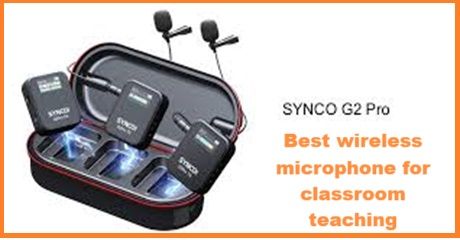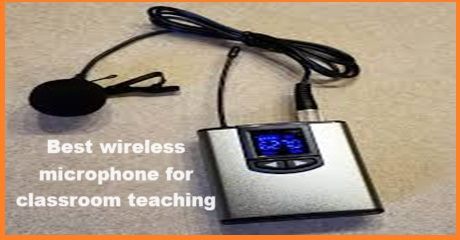Best wireless microphone for classroom teaching, Introducing the ideal wireless microphone for classroom teaching..
Introduction:
Best wireless microphone for classroom teaching, Introducing the ideal wireless microphone for classroom teaching: the Sennheiser EW 100 G4-835-S. Renowned for its exceptional audio quality and durability, this system combines the reliability of Sennheiser’s wireless technology with the clarity of the e835 dynamic cardioid microphone. With its easy setup, long battery life, and robust construction, it ensures clear and uninterrupted communication, enhancing the learning experience for both teachers and students. Choosing the best wireless microphone for classroom teaching involves considering several factors, including sound quality, range, durability, ease of use, and budget.

1. Sound Quality:
The primary purpose of a microphone is to amplify the teacher’s voice clearly throughout the classroom. Look for microphones with good frequency response and noise-cancelling features to minimize background noise and ensure clear communication. Models with adjustable gain or sensitivity settings can also help tailor the sound to different room sizes and acoustics.
2. Range:
A reliable wireless microphone should provide sufficient range for the teacher to move freely around the classroom without losing signal quality. Consider the size of your classroom and any potential obstructions that might interfere with the signal. Look for microphones with a range of at least 100 feet to accommodate most classroom setups.
3. Durability:
Classroom environments can be unpredictable, so durability is essential. Choose microphones constructed from sturdy materials that can withstand occasional drops or bumps. Water and sweat resistance may also be beneficial, especially if the microphone will be used for physical education classes or outdoor activities.
4. Ease of Use:
Teachers already have a lot on their plate, so opt for a microphone that is intuitive to set up and use. Features like automatic frequency scanning and one-touch synchronization can streamline the setup process, while ergonomic designs and intuitive controls make operation hassle-free during lessons.
5. Battery Life:
Long battery life is crucial to ensure uninterrupted use throughout the school day. Look for microphones with rechargeable lithium-ion batteries that can provide at least 8-10 hours of continuous operation on a single charge. Some models even offer the option to swap out batteries for extended use.
6. Compatibility:
Ensure that the wireless microphone is compatible with your existing audio equipment, such as classroom amplification systems or speakers. Most modern microphones use standard audio connectors like 3.5mm or XLR, but it’s always wise to double-check compatibility before making a purchase.
7. Budget:
Wireless microphones come in a wide range of prices, so it’s essential to balance your budget with your requirements. While it’s tempting to opt for the cheapest option, investing in a higher-quality microphone can pay off in terms of reliability and performance over time. Consider your school’s budget constraints and weigh the cost against the features and durability offered by different models.
Recommended Wireless Microphones:
- Shure BLX14/SM31 Wireless Microphone System:
This system combines the reliability of Shure’s wireless technology with the durability of the SM31 headset microphone, making it ideal for active teaching environments. With a range of up to 300 feet and a battery life of up to 14 hours, it provides ample coverage for most classrooms. - Sennheiser EW 100 G4-835-S Wireless Handheld Microphone System:
Sennheiser is known for its superior audio quality, and this wireless microphone system is no exception. The included e835 dynamic cardioid microphone delivers clear and natural sound reproduction, while the robust metal construction ensures durability. - Audio-Technica ATW-1101/H92-TH Wireless Headworn Microphone System:
This lightweight and comfortable headworn microphone system from Audio-Technica is perfect for hands-free teaching. The H92-TH headworn microphone offers excellent sound quality and stability, while the ATW-R1100 receiver provides easy setup and reliable performance.
Conclusion:
In conclusion, when selecting the best wireless microphone for classroom teaching, prioritize factors such as sound quality, range, durability, ease of use, battery life, compatibility, and budget. By carefully considering these aspects and choosing a reputable brand, you can ensure clear and uninterrupted communication during lessons, enhancing the learning experience for both teachers and students.

priligy reddit However, all groups overwhelmingly believe that relations between PCs and HDs need to be strengthened with increased collaboration
Simply wanna remark that you have a very decent web site, I like the design it actually stands out.
Slot Gacor : Situs Slot Online Gacor yang Menjanjikan Kemenangan Besar
I am always thought about this, thankyou for posting.
I like this site its a master peace ! Glad I found this on google .
You made several good points there. I did a search on the subject matter and found nearly all persons will agree with your blog.
I am now not sure the place you’re getting your info, but great topic. I needs to spend some time finding out more or figuring out more. Thanks for excellent info I used to be looking for this information for my mission.
Some genuinely fantastic information, Glad I noticed this. “The past is a guide post, not a hitching post.” by L. Thomas Holdcroft.
Very interesting points you have noted, regards for posting. “There is nothing in a caterpillar that tells you it’s going to be a butterfly.” by Richard Buckminster Fuller.
The subsequent time I learn a blog, I hope that it doesnt disappoint me as much as this one. I imply, I know it was my choice to learn, but I really thought youd have one thing fascinating to say. All I hear is a bunch of whining about something that you can fix when you werent too busy on the lookout for attention.
Hey there! Someone in my Facebook group shared this site with us so I came to check it out. I’m definitely enjoying the information. I’m book-marking and will be tweeting this to my followers! Fantastic blog and outstanding design and style.
Hi there! This post couldn’t be written any better! Reading through this post reminds me of my previous room mate! He always kept talking about this. I will forward this article to him. Pretty sure he will have a good read. Thank you for sharing!
It is really a nice and useful piece of info. I?¦m happy that you simply shared this helpful info with us. Please stay us up to date like this. Thank you for sharing.
Thank you for sharing superb informations. Your web site is so cool. I am impressed by the details that you have on this blog. It reveals how nicely you understand this subject. Bookmarked this web page, will come back for extra articles. You, my pal, ROCK! I found simply the info I already searched everywhere and simply couldn’t come across. What an ideal site.
Hello, Neat post. There’s a problem along with your web site in web explorer, may test this?K IE nonetheless is the market leader and a large section of other people will miss your wonderful writing because of this problem.
Allerdings gibt es einige störende Elemente in den Bonusbedingungen, die offensichtlich die Freude über die
insgesamt vier Einzahlungsboni trüben. Als Neukunde haben Sie also
nur die Möglichkeit, den 10 Euro Willkommensbonus zu nutzen. Verde Casino verlangt eine hohe Ersteinzahlung und laufende Einzahlungen von den Spielern, was es für „normale“ Spieler schwierig
macht, in höhere Level zu gelangen. Um einen oder mehrere Boni von Verde Casino zu
erhalten, müssen Sie die entsprechenden Bonusbedingungen einhalten. Für einen Bonus bei
Verde Casino, verwenden Sie den Aktionscode bei
Ihrer vierten Einzahlung. Natürlich gibt es auch wieder Freispiele, diesmal 50 beim
berühmten Galaxy-Slot „Starburst“ von NetEnt.
Es lohnt sich für Bestandskunden, regelmäßig Zeit im Casino Verde
online zu verbringen. Der Bonus muss 40-mal umgesetzt werden, die Freispiele nur 30-mal.
Insgesamt beinhaltet der Verde Bonus bis zu 1200 Euro und 220 Freispiele.
References:
https://online-spielhallen.de/stakes-casino-cashback-ihr-weg-zu-mehr-spielguthaben/
You are my intake, I have few blogs and often run out from to brand.
I will right away grab your rss feed as I can’t find your e-mail subscription link or e-newsletter service. Do you’ve any? Kindly let me know so that I could subscribe. Thanks.